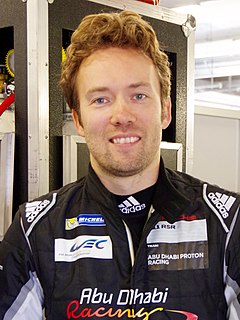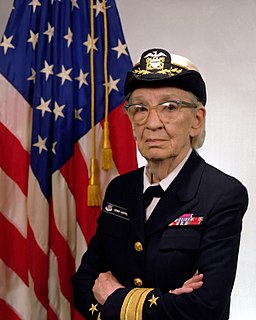A Quote by Douglas Adams
For seven and a half million years, Deep Thought computed and calculated, and in the end announced that the answer was in fact Forty-two - and so another, even bigger, computer had to be built to find out what the actual question was.
Related Quotes
To be a scientist you have to be willing to live with uncertainty for a long time. Research scientists begin with a question and they take a decade or two to find an answer. Then the answer they get may not even answer the question they thought it would. You have to have a supple enough mind to be open to the possibility that the answer sometimes precedes the question itself.
In the space of one hundred and seventy-six years the Mississippi has shortened itself two hundred and forty-two miles. Therefore, in the Old Silurian Period the Mississippi River was upward of one million three hundred thousand miles long, seven hundred and forty-two years from now the Mississippi will be only a mile and three-quarters long. There is something fascinating about science. One gets such wholesome returns of conjecture out of such a trifling investment of fact.
If you thought you were trying to find out more about it because you're gonna get an answer to some deep philosophical question...you may be wrong! It may be that you can't get an answer to that particular question by finding out more about the character of nature. But my interest in science is to simply find out about the world.
What is there to understand? The significance of life? How long will it take to understand the significance and the meaning of life? 20 years? 30 years? And the same question will be here in another 20 years, I guarantee you. Until you stop asking that question. When that question is not there, you are there. So that's the reason why you keep asking the question: you do not want the question to come to an end. When that comes to an end, there will not be anybody, left there, to find out the meaning, the purpose and the significance of life.
The most spectacular thing about Johnny [von Neumann] was not his power as a mathematician, which was great, or his insight and his clarity, but his rapidity; he was very, very fast. And like the modern computer, which no longer bothers to retrieve the logarithm of 11 from its memory (but, instead, computes the logarithm of 11 each time it is needed), Johnny didn't bother to remember things. He computed them. You asked him a question, and if he didn't know the answer, he thought for three seconds and would produce and answer.
Before 'Dilbert,' I tried to become a computer programmer. In the early days of computing, I bought this big, heavy, portable computer for my house. I spent two years nights and weekends trying to write games that I thought I would sell. Turns out I'm not that good a programmer, so that was two years that didn't work out.
A dialogue is very important. It is a form of communication in which question and answer continue till a question is left without an answer. Thus the question is suspended between the two persons involved in this answer and question. It is like a bud with untouched blossoms . . . If the question is left totally untouched by thought, it then has its own answer because the questioner and answerer, as persons, have disappeared. This is a form of dialogue in which investigation reaches a certain point of intensity and depth, which then has a quality that thought can never reach.
When I am at a dinner table, I love to ask everybody, 'How long do you think our species might last?' I've read that the average age of a species, of any species, is about two million years. Is it possible we can have an average life span as a species? And do you picture us two million years more or a million and a half years, or 5,000?
War and culture, those are the two poles of Europe, her heaven and hell, her glory and shame, and they cannot be separated from one another. When one comes to an end, the other will end also and one cannot end without the other. The fact that no war has broken out in Europe for fifty years is connected in some mysterious way with the fact that for fifty years no new Picasso has appeared either.
I wrote the first draft of the New People quickly but it had been percolating a lot longer. It's a hard question to answer because I'd been working on another novel for years and when I gave up on that, this one came very easily. But I think the work had been going on a lot longer than the actual writing.



































